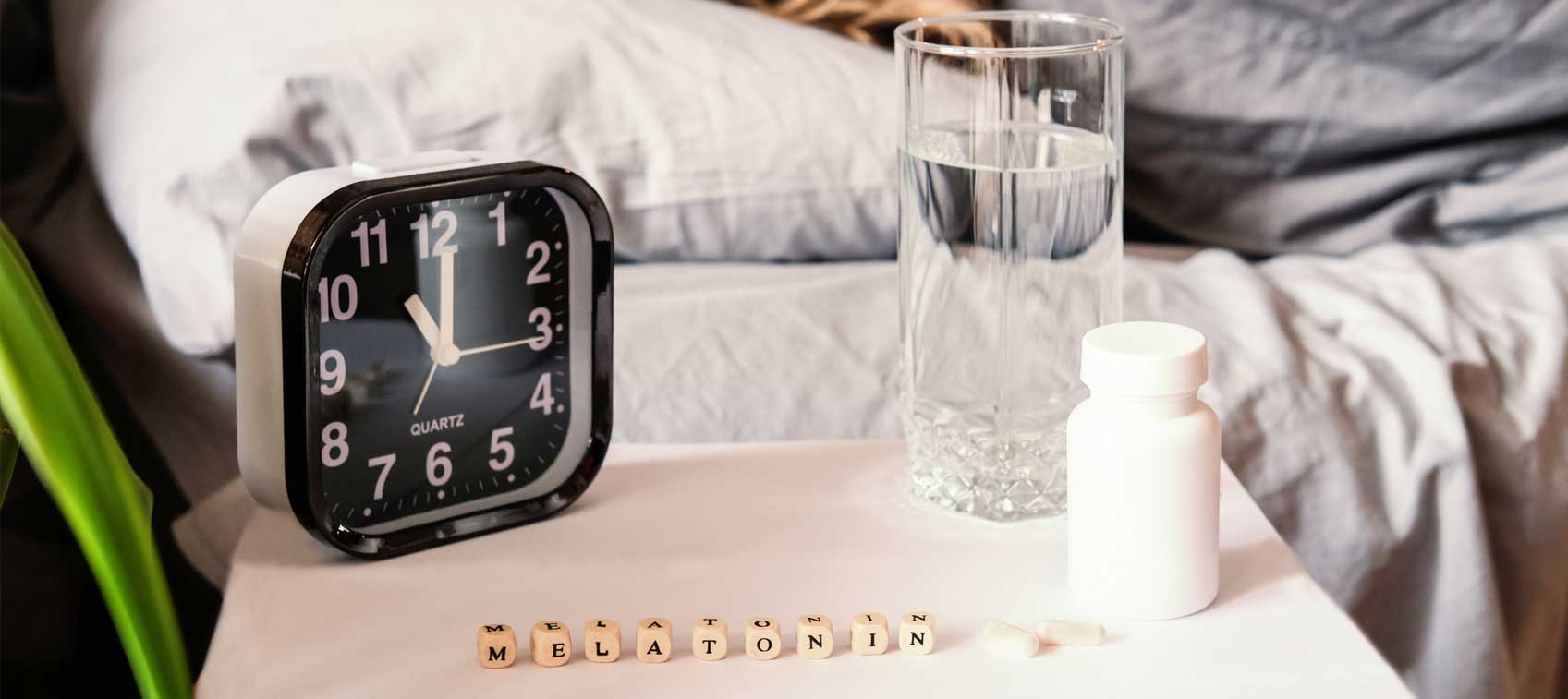
Your body runs like clockwork—literally. Genetically programmed molecular clocks in your cells orchestrate 24-hour fluctuations in heart rate, blood pressure, metabolism, temperature, hormone release, and other basic functions.
Circadian rhythms (from the Latin circa and dies, meaning “about a day”) are in play in virtually all animals and plants, and even in some bacteria and fungi. These predictable patterns are synchronized with the rotation of the earth, and the most obvious—the sleep/wake cycle—is closely linked with melatonin.
Let’s look at the supporting role of melatonin in regulating circadian rhythms and how supplemental melatonin not only enhances sleep but may also improve other aspects of your health and wellbeing.
Dark/Light Cycles & Melatonin Secretion
Sleep is tightly controlled by circadian rhythms. We’ve all experienced the misery of jet lag. Crossing time zones throws our internal timekeepers off-kilter, making us sleepy during the day and wide awake at night. Jet lag aside, one in three Americans fails to get adequate sleep, in large part because of the mismatch between our molecular clocks and modern lifestyles.
That’s because light and melatonin are central to the circadian rhythm of sleep. Signaled by the onset of darkness, the pineal gland begins releasing melatonin—the “sleep hormone”—around 8:00–9:00 in the evening, making you sleepy. Levels peak during the middle of the night while you slumber, then gradually taper off as morning arrives.
The trouble is that in today’s world, artificial light has blurred the boundaries between night and day. Exposure to light at night—especially short-wavelength blue light emitted by LEDs, TVs, computers, tablets, and smartphones—interferes with our biological clocks. Studies have found that people who were exposed to light-emitting devices in the evening stayed awake longer, produced less melatonin, got less REM sleep, and were sleepier the next morning.
Beyond Sleep—The Impact of Circadian Rhythm Disruptions
If you watch TV or use your digital devices for hours on end night after night—as many people do—it can alter your body’s natural 24-hour cycles, with adverse effects that extend beyond insomnia, daytime sleepiness, and fatigue.
When your circadian rhythm is out of whack, inflammation, blood pressure, and other markers of cardiovascular and metabolic dysfunction increase. Hormones that signal hunger and satiety are thrown off, which can lead to weight gain and diabetes. Mood changes, cognitive problems, and some neurological disorders are also linked with circadian rhythm disturbances.
Chronic disruption, which can occur with nighttime work or rotating shifts, is associated with increased risk of depression, obesity, cardiovascular disease, diabetes, and cancer. In fact, the World Health Organization has classified shift work as a probable carcinogen!
Tune Up Your Body Clock With Light
Do your best to sync your activities with your body’s innate circadian rhythms. In the morning, turn on the lights, open the shades, and let the sunshine in. Just as darkness signals melatonin release and sleep, daylight helps you wake up, jumpstarts metabolism, and boosts mood, energy, and alertness.
Avoid eating late in the evening and go to bed at a reasonable and regular time. Turn off your TV, smartphone, computer, and other devices a couple of hours before bedtime. If you just can’t pull the plug on your light-emitting devices, opt for the evening settings or get a blue light-blocking app.
Light is actually used therapeutically to help reset circadian rhythms. Exposure to bright full-spectrum light is a safe and effective treatment for jet lag and certain sleep disorders, as well as dementia, bipolar disorder, and depression, especially seasonal affective disorder (the “winter blues”).
Supplemental Melatonin & Circadian Rhythms
Supplemental melatonin can also help. It is routinely used to treat circadian rhythm sleep disorders such as jet lag, shift work disorder, and delayed or advanced sleep phase disorder—conditions marked by going to sleep and waking up much later or earlier than what is considered normal.
Melatonin’s usefulness is not limited to sleep problems. It is also being studied as a treatment for cancer, psychiatric disorders, and Alzheimer’s disease. Many of these extra benefits are directly related to melatonin’s function in sleep and circadian rhythms, but it has potent antioxidant and anti-inflammatory activity as well.
Finally, melatonin has been proposed as a potential therapy for healthy aging. Given that aging is accompanied by declines in melatonin levels and changes in sleep patterns—and restorative sleep is essential for many aspects of health—it makes perfect sense.
How to Use Melatonin
For now, I primarily recommend melatonin for sleep problems. Studies show that it can help shorten the time it takes to fall asleep and support deeper, more restful sleep.
The recommended dose of melatonin for sleep is 1–6 mg, with an average of 3 mg. Extended-release supplements, which mimic the natural gradual release of melatonin over several hours, may be preferable—especially if you tend to wake up in the middle of the night and have trouble getting back to sleep. The best time to take melatonin for sleep is about 30 minutes before bedtime.
Melatonin can be taken alone or in sleep supplements that contain other natural sleep aids such as GABA, L-theanine, 5-HTP, and valerian. It is generally well tolerated, although there have been reports of next-day drowsiness, headache, and nausea, especially with higher doses.
Melatonin is safe and, unlike prescription sleeping pills, non-addictive. However, if you are on any prescription medications, it is always a good idea to talk to your doctor before adding a new supplement.


